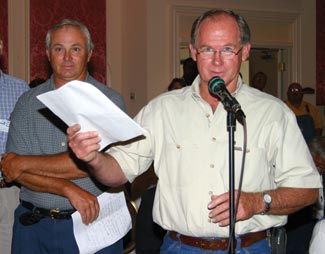Alabama Farmers Speak Out On Farm Bill

Farmers from Mobile to Madison County attended USDA’s Farm Bill Forum at Tuskegee University Aug. 25. A standing-room-only crowd estimated at more than 500 farmers and Alabama USDA officials spoke about what they’d like to see in the next farm bill slated to take shape in 2007.While 2007 might seem a long way off, U.S. Agriculture Secretary Mike Johanns said he wants adequate time to have listening sessions throughout the country to gain a broad, first-hand perspective from farmers and others affected by the Farm Bill. Information from the sessions, along with suggestions submitted in writing and by email to USDA, will be compiled and then considered when the bill is being crafted.”We want to get an idea of what we are doing, what we might do differently and where we are in need of improvement,” Johanns said.Six areas of discussion were outlined for farmers’ comments. However, some took the opportunity to tell Johanns about particular problems on their farms. Many also asked that the current farm bill not be altered until the 2007 farm bill is fashioned.”It was important for the secretary to come and hear all the concerns that folks in agriculture in Alabama have about their futures,” said Alabama Farmers Federation President Jerry A. Newby, who attended the meeting. “I think that farmers are concerned whether the administration will continue to support the existing farm bill and fully fund it. They also are concerned about maintaining profitability on their farms as well as conservation programs that could be included in the new farm bill.”Newby said the Federation already is making plans about how Alabama farmers can help shape the upcoming farm bill, adding that the state is fortunate to have three members on the House Agriculture Committee.”We will have people testifying and meeting with congressmen to make sure our farmers, and specifically the needs of Alabama farmers, are considered,” Newby said.Farmers representing nearly every commodity in the state offered comments during the forum. Topics included farm price supports, incentives to encourage production of renewable fuels, funding for land grant universities, removing trade barriers, an overhaul of the Conservation Reserve Program, improving technology infrastructure in rural areas and crop insurance.Johanns said the success of American farmers was responsible in part for lower commodity prices. He said 27 percent of U.S. agricultural sales come from foreign trade, and while farm productivity rises by about 2 percent per year, domestic demand rises by less than 1 percent.”We’ve got to adopt policies that recognize that production is exceeding consumption,” Johanns said. “We need markets to open for our products.”But until those markets are open to American products, farmers testified they need to receive price supports or they will go out of business. Many also warned if support prices stop, the United States would become dependent on other countries for food, comparing it to the current fuel crisis that has caused the price of petroleum products to skyrocket.While farmers were limited to about two minutes of testimony each, Johanns encouraged them to submit their comments and suggestions through USDA’s website at www.usda.gov/farmbill.
